Research Papers by Laboratory for Comparative Social Research (LCSR) / Лаборатория сравнительных социальных исследований (ЛССИ)
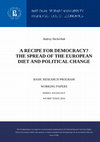
This paper reveals the relationship between the improvement in human diet and the transition to d... more This paper reveals the relationship between the improvement in human diet and the transition to democracy. The spread of a ‘European diet’ with a historically unprecedented high proportion of animal protein in the daily calorie intake is considered one of the factors of regime change since 1992. In contrast to other studies, I regard European diet as an outcome of a long historical transformation and show that an improvement in nutrition preceded regime change. Data on nutrient consumption around the world are from the Food balance sheet data from FAOSTAT. Based on this data I was able to define a European diet as containing animal-protein rich items (mostly, meat and dairy), alcohol beverages and sugar. Using OLS, factor analysis and SEM, the direct and indirect effects of the European diet on the chance of a transition to democracy were tested. The findings reveal that an improvement in diet affects regime change, but not vice versa.

Maintain autocratic regimes is widely acknowledged to require elite loyalty. However, does this i... more Maintain autocratic regimes is widely acknowledged to require elite loyalty. However, does this imply that various elite groups equally contribute to the daily performance of an autocratic regime and to winning elections? Based on empirical evidence of recent gubernatorial elections in Russia we explore the effect of multilevel elite disloyalty on gubernatorial electoral results and voter turnout. Having examined the impact of major regional elites, we find that only conflicts between governors and the mayors of regional capitals hav¬¬e significant and robust negative effect on both electoral turnout and the voting for governor. Encouraging the loyalty of these mayors secures smoother political machinery in the most electorally significant areas of the region and thus can determine the outcome of an electoral campaign. This finding provides another confirmation of the paramount role of covert rather than open inter-elite competition for electoral autocracies maintenance.

This paper deals with the recently revealed paradox that contemporary Muslims demonstrate a stron... more This paper deals with the recently revealed paradox that contemporary Muslims demonstrate a stronger Protestant work ethic (PWE) than contemporary Protestants do. I test whether this paradox is supported in a multilevel analysis on internationally comparative WVS data. According to Inglehart’s theory of post-materialist shift, work ethic should be stronger in the developing societies that do not have enough existential security. Following the debate on the Protestant work ethic I test another hypothesis saying that the effects of PWE extend beyond the religious population of Protestant countries. On waves four and five of the World Values Survey, I compare the strength of work ethic between the Muslims and Protestants in multilevel ordinal outcome models. The models built on 26,156 respondents in 56 countries show no significance in work ethic between Muslims and Protestants, all else being equal. Living in a historically Protestant society does not increase work ethic by itself, but being religious in a Protestant society does. In all developed countries, work ethic is likely to decrease. Overall, the evidence of a stronger work ethic among the Muslims is changeable; in some models, Muslims are likely to have a stronger work ethic than Protestants, but in other models Muslims are not significantly different from Protestants. This poses further research questions about the universal features of different religious ethics and on the non-religious factors explaining the progress linked with the Protestant work ethic.

Considering diet as often a product of adaptation to geographic environment, this paper suggests ... more Considering diet as often a product of adaptation to geographic environment, this paper suggests that not only amount of food (food abundance) is important, but what kind of foods people eat may also affect social change. One of the reasons for variation in diet is food intolerances as a result of adaptation to the environment. This paper investigates one case – lactase persistence. This trait is associated with different genotypes of LCT gene. Lactase persistence is mostly spread among northern Europeans, and is also found among some African and Asian nomadic populations. Such unique trait is usually explained in the gene-culture coevolution framework: selective pressure for it had to be followed by expansion of dairying and herding. Empirical analysis based on 78 populations reveals strong and positive association between share of lactase persistent population and distribution of emancipative values. The suggested causal mechanism is change in demographic trends: the effect of lactase persistence on the emancipative values is mediated through historically lower fertility and lower child mortality rates. Demographic transition results in higher value of human life, formation of human capital, economic development and finally cultural change.
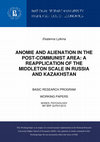
Unlike commonly used, anomie and alienation not only have different theoretical backgrounds, but ... more Unlike commonly used, anomie and alienation not only have different theoretical backgrounds, but also different indicators and predictors. I examine the highly institutionalized alienation scale originally introduced by Middleton (1963), reapplied as a measurement of alienation (Seeman, 1991) and anomie (Huschka and Mau 2005, 2006) in a very relevant context for an anomic situation – the post-Communist countries Russia and Kazakhstan (round six of the World Values Surveys fielded the alienation question in just these two countries). Based on confirmatory factor analysis and multiple group comparisons, I find that the scale consists of two dimensions, which can be described as an anomie and alienation. The anomic dimension consists of indicators “normlessness” and “powerlessness,” whereas the alienative one is comprised by “social isolation”, “meaninglessness,” and “job dissatisfaction.” Though the structure proves to have full invariance in both countries, the predictors for anomie and alienation are different. For both countries, only income is an important predictor for anomie, and though to a lower degree, for alienation. In Kazakhstan, the level of urbanization also provides an impact on the level of anomie. Apart from income, in Russia alienation can be predicted by gender, and type of occupation (manual or intellectual), whereas in Kazakhstan it can be predicted by age.
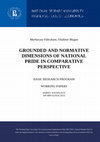
The objective of this paper is to describe cross-country similarities and differences in national... more The objective of this paper is to describe cross-country similarities and differences in national pride and to explain national pride variations on the individual and country levels. The analysis in this paper is applied to different measures of national pride, with some of them being relatively complex cognitively and the others more elementary. The paper presents the results of cross-country comparison of national pride based on empirical evidence from the ISSP-2003 database which included data from 45993 respondents from 36 countries and regions. The survey participants estimated their overall level of national pride by responding to the direct one-item question and, separately, they estimated pride of each of ten specific achievements of their countries in various domains. Factor analysis of these ten items yielded two dimensions of domain-based national pride, one of them being the factor of general pride of various country achievements and the other reflects the inverse relations between the prides of elitist and mass achievements of the nation.
The multilevel regression models estimated for the three indicators of national pride confirm the feasibility of dividing these indicators into cognitively processed and normatively imposed national pride. Cognitively processed national pride measured by the domain-based estimates have been affected by objective country achievements and by the level of standards which the achievements are compared against. The normatively imposed national pride measured by direct one-item question has been influenced by the country level of religiosity that indicates the individual willingness to accept normative messages from the state uncritically.
Rational national pride requires some objective grounds to believe in a nation’s perfection, and normative national pride is not so strongly related to objective achievements and therefore can be more easily manipulated. The practical implication of this difference stems from the fact that in their search for objectively grounded national pride people would be eager to foster country achievements and their maintenance of normatively imposed pride requires in many cases just reliably protected wishful thinking.
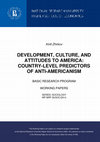
The present study examines survey data from 45 countries by the means of factor and regression an... more The present study examines survey data from 45 countries by the means of factor and regression analyses in order to understand the nature and causes of anti-Americanism. Empirical results reveal a clear distinction between cultural and political anti-Americanism. The former involves negative attitudes towards American culture and its global spread, whereas the latter is specifically focused on disapproval of the U.S. foreign policies. The two forms of anti-Americanism also differ in their relationship to socioeconomic development. Cultural anti-Americanism is most widespread in countries with average levels of Human Development Index, whereas political anti-Americanism is stronger in the most developed societies. This study finds that Muslim societies are characterized by higher levels of both cultural and political anti-Americanism. On the whole, these findings indicate that anti-Americanism follows consistent country-level patterns and likely has universal roots which should be studied within a comparative framework.
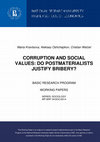
Using World Values Survey data from dozens of countries around the world, this article analyzes t... more Using World Values Survey data from dozens of countries around the world, this article analyzes the relationship between postmaterialist values and attitudes towards bribery in a multilevel framework. This is an inherently interesting and under-researched topic because the various
propensities attributed to postmaterialism lead to conflicting expectations about how these values affect attitudes towards bribery. On one hand, the alleged tendency of postmaterialists towards
impartiality should lead them to condemn bribery. On the other hand, condemning bribery is a social desirability issue and postmaterialists are known to be less susceptible to desirability pressures and more relaxed about norm deviations. From this point of view, postmaterialists
might be more tolerant toward bribery. Reflecting these conflicting expectations, we obtain an ambivalent result, evident in an inverted U-shaped relationship: as we move from pure materialism to mixed positions, people tend to justify bribery more, but then moving from mixed positions to pure postmaterialism, people become again more dismissive of bribery. What is more, the demographic prevalence of postmaterialists in a country moderates these values’ effect on bribery: where postmaterialists are more prevalent, the disapproving effect on bribery outweighs the approving effect. This finding contributes to a better understanding of the pronounced negative correlation between corruption and postmaterialism at the country level and has some important implications.
This paper looks at the effect of parental occupational status on their children’s occupational s... more This paper looks at the effect of parental occupational status on their children’s occupational status and earnings in Russia. The analysis based on twelve surveys conducted from 1991 to 2011 (n=21,639) demonstrates a statistically significant effect of parental occupational status on respondents’ occupational status and earnings even after controlling for respondents’ education. Contrary to previous findings (Gerber and Hout 2004), the association between social origins and destinations did not strengthen over time. The size of the effect of parental status in Russia is similar to other European countries. A separate analysis shows that monetary returns on higher education increased in post-Soviet Russia, while returns on higher education in terms of occupational status decreased.
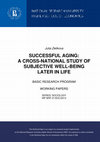
This paper aims to identify and analyze the life course and contextual factors that influence the... more This paper aims to identify and analyze the life course and contextual factors that influence the subjective well-being (SWB) of individuals over 60 years of age. Our research is based on the results of the 5th wave of the World Value Survey. We have investigated the level of SWB for older people at both the individual and country level. The results of our research demonstrate that the strongest predictors of SWB later in life are satisfaction with one’s financial state, health, and a sense of control, meaning the belief that individuals are in control of their lives. Besides this, the important factors of SWB for older people are the ability to establish and maintain friendly relations with other people, such as family members and friends, and to invest their own resources in positive emotions and important relationships for themselves. Older people from ex-communist countries have the lowest level of SWB. Older people from English-speaking countries, such as the United States, Canada, New Zealand, and the United Kingdom, have, by contrast, the highest level of SWB. These results suggest that the degree of modernization influences SWB levels very strongly. For older people, the country in which they live, the level of democracy, GDP per capita, freedom, and tolerance are very important. In contemporary society, the later period of life is a time for self-realization, new activities, new leisure, and new emotions. If society understands the needs of older people and provides opportunities for their realization, society can overcome the challenges caused by population aging. Only then can we discuss the concept of ‘successful aging’
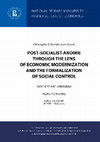
This paper inquires into how economic modernization impacts normative regulation by spurring, on ... more This paper inquires into how economic modernization impacts normative regulation by spurring, on the one hand (a) formal media of normative regulation (also known as formal social control) in the spheres of politics, economics and interpersonal relations and, on the other hand, (b) informality via the lower density of norms (also known as anomie). This work then asks how these two processes relate to one another. Evidence indicates that modernization is clearly linked to formal media of normative regulation in the spheres of politics (measured as greater government effectiveness), economics (i.e. lower proportion of shadow economy), and interpersonal relations (i.e. less reliance upon family and friendships). Moreso, our multi-level regression models, using World Values Survey data, report that political formality (government effectiveness) at the country level is linked to less anomie at the individual level. Overall, we suggest that economic growth initially brings normlessness through undermining informal social control. However, with greater economic stock, there is a tendency for greater political formalization, formal social control, which brings levels of anomie down. Furthermore, even after all controls, there is a strong anomie syndrome in post-communist societies

The basic values of the Russian population and the population of 31 European countries were compa... more The basic values of the Russian population and the population of 31 European countries were compared with data obtained by the Schwartz Questionnaire, embedded into the fourth round of the European Social Survey. Conclusions about similarities and differences of basic human values between Russia and other European countries confirm the thesis that Russia is a country which shares a general logic of cultural and social development with the rest of the world and which has a lot in common with countries of a similar economic level and recent political history. In most value comparisons, Russia appeared to be closer to Post-Communist and Mediterranean countries than to Western European or Nordic countries. The fact that Russians are less committed than most Europeans to the values of caring, tolerance, equality, and ecology, and, conversely, more committed than most Europeans to the competitive “zero-sum” values of personal success, wealth, and power, confirms the validity of current moral criticisms of mass values and morals in Russia. The other disturbing fact is the relatively low commitment of Russians to the values of Openness to Change and, conversely, a strong focus on Conservation. So basic values of Russians create a cultural barrier to the development of an innovation-based economy and to the societal development as a whole. Thanks to a shift from country-level analysis to individual- and group-level analysis, we challenge the notion of the “average Russian” and demonstrate that the Russian value majority consists of two subtypes. Russia also has a sizable value minority and its members share values non-typical for most Russians. Two value minorities, which embrace 19% of the Russian population, are more committed to values of Openness and Self-Transcendence than the rest of the Russian population. These value groups are typical for European countries with more prosperous and happy populations and we can hypothesize that in Russia they are also resource groups for the country’s advancement.
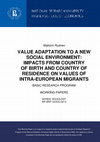
This paper challenges the common assumption that basic human values remain stable during the life... more This paper challenges the common assumption that basic human values remain stable during the lifetime of an individual. The author demonstrates individual value change by studying migrants’ values which are prone to change after a move to a new country. Using cross-sectional data, the author estimated the relative impacts of country of birth and country of residence – and values that are common – on individual values of migrants. Values were measured by Schwartz’s questionnaire as well as Inglehart’s Self-Expression items. Cross-classified multilevel regression models were applied to the sample of migrants, selected from five rounds of the European Social Survey. The results demonstrated the significance of both the country of residence and the country of birth as well as values which are common in these countries. Surprisingly, the impact of the country of residence on migrants’ values appeared to be higher than the country of birth. Furthermore, values which are common in the country of residence have a higher impact on migrant values than values widespread in their country of birth. The findings suggest that values are only partly formed during the formative period and keep changing throughout a person’s life.
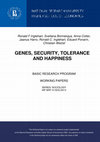
Ronald F. Inglehart, Svetlana Borinskaya, Anna Cotter, Jaanus Harro, Ronald C. Inglehart, Eduard Ponarin, Christian Welzel, "Genes, Security, Tolerance and Happiness", Series: Sociology, WP BRP 31/SOC/2013 This paper discusses correlations between certain genetic characterestics of the human population... more This paper discusses correlations between certain genetic characterestics of the human populations and their aggregate levels of tolerance and happiness. We argue that a major cause of the systematic clustering of genetic characteristics may be climatic conditions linked with relatively high or low levels of parasite. This may lead certain populations to develop gene pools linked with different levels of avoidance of strangers, which helped shape different cultures, both of which eventually helped shape economic development. Still more recently, this combination of distinctive cultural and economic and perhaps genetic factors has led some societies to more readily adopt gender equality and high levels of social tolerance, than others. More tolerant societies tend to be happier because they create a more relaxed environment conducive to happiness.
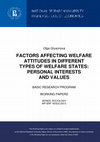
This study examines the effect of personal interests and basic human values on the degree of supp... more This study examines the effect of personal interests and basic human values on the degree of support for a welfare state. Data from the European Social Survey, round 4 (2008) for 29 European countries (total n = 56,752) was used for the study. Results show that values such as collectivism and altruism promote demand for state intervention in welfare, while values like individualism and egoism negatively affect it. Income has the strongest negative effect on support for a welfare state among all the factors tested, even more so than gender and employment status in all types of welfare states. Compared to other countries (familialistic, social-democratic, conservative, and liberal), former USSR and ex-communist countries seem to be more influenced by collectivistic and individualistic values, and education. In addition, in ex-communist countries, altruistic and egoistic values have a crucial impact on the demand for a welfare state. In liberal, conservative, and social-democratic countries, values and education do not have much impact.

Gender differences in mathematical performance have been long debated in psychology, economics, a... more Gender differences in mathematical performance have been long debated in psychology, economics, and sociology. We contribute to this literature by analyzing a large data set of high school graduates who in 2011 took a standardized mathematical test in Russia (n = 738,456). We �find no substantial difference in mean test scores of boys and girls. However, boys have a greater variance of scores and are more numerous at the top of the distribution. We apply quantile egression to model the association between school characteristics and gender differences in test scores throughout the distribution. Male advantage in test scores, particularly at the top of the distribution, is concentrated in cities and in schools with the advanced curriculum. In ordinary high schools, especially in the countryside, gender differences in all parts of the distribution are very small. A separate analysis at the regional level confirms that male advantage in mean test scores is higher in more urbanized regions.

How do insecure property rights over land affect electoral competition and the level of violence?... more How do insecure property rights over land affect electoral competition and the level of violence? To answer this question, I explore original empirical evidence from Dagestan, Russia’s most turbulent North Caucasian republic. The exploration is based on a statistical analysis of district-level data with special emphasis on chronological validity. Studying the relationship between land titles of the Soviet period and post-Soviet amounts of tenured land, the research demonstrates that the amount of unregistered land in each district has a profound effect on local electoral competition and indices of violence. A higher percentage of untenured land at the district level leads to less electoral competition and more intense violence. Consequently, the study finds that the insecurity of property rights creates an opportunity structure for electoral patronage and violent expression of conflicts and grievances. In theoretical perspective this study sheds light upon a relatively unexplored institutional factor that drives electoral process and violence in predominantly agrarian societies.
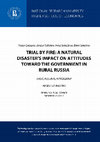
This study aims to explore the psychological foundations of political support under a nondemocrat... more This study aims to explore the psychological foundations of political support under a nondemocratic regime by investigating the impact of a natural disaster on attitudes toward the government. The research exploits the enormous wildfires that occurred in rural Russia during the summer of 2010 as a natural experiment. Since wildfire spreads due to the direction of the wind, the local distribution of fire is as if random: one village may burn while the neighboring village is left unscathed. We test the effects of this exogenous variation with a survey of almost 800 respondents in randomly selected villages, 34 of which were burned and 36 of which were unburned, in the four regions of Russia that were most severely affected. Contrary to the conventional scholarly wisdom that suggests that natural disasters cause people to blame politicians, our study finds that in the burned villages there is higher support for the government at all levels, namely for the United Russia Party, the village head, the governor, Prime Minister Putin, and President Medvedev. Most counterintuitively, the rise of support for authorities cannot be fully explained by the generous governmental aid provided to the villages that were damaged by the fires. We interpret the results within the framework of system justification theory, developing it by adding to individual characteristics the factors of the political regime and the demonstration effect.
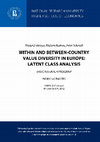
In order to combine a study of within-country value diversity and cross-country differences, we a... more In order to combine a study of within-country value diversity and cross-country differences, we applied a person-centered approach. Instead of focusing on the distinct value items, respondents from the 33 European countries were classified on the basis of the whole set of Schwartz value items (Portrait Values Questionnaire) by means of Latent Class Analysis. Six Pan-European value classes were found; they differ both by rank of values and degree of value preferences. Surprisingly, a class with the least pronounced value preferences appeared to be the largest one (38%).
In each country all six value classes are represented. Nordic and Western European countries have more uniform distributions of value class shares than Post-Communist and Mediterranean countries; this is suggested to be an implication of societal developmental processes which start from the few people who commit themselves to the values of more advanced countries.

Uploads
Research Papers by Laboratory for Comparative Social Research (LCSR) / Лаборатория сравнительных социальных исследований (ЛССИ)
The multilevel regression models estimated for the three indicators of national pride confirm the feasibility of dividing these indicators into cognitively processed and normatively imposed national pride. Cognitively processed national pride measured by the domain-based estimates have been affected by objective country achievements and by the level of standards which the achievements are compared against. The normatively imposed national pride measured by direct one-item question has been influenced by the country level of religiosity that indicates the individual willingness to accept normative messages from the state uncritically.
Rational national pride requires some objective grounds to believe in a nation’s perfection, and normative national pride is not so strongly related to objective achievements and therefore can be more easily manipulated. The practical implication of this difference stems from the fact that in their search for objectively grounded national pride people would be eager to foster country achievements and their maintenance of normatively imposed pride requires in many cases just reliably protected wishful thinking.
propensities attributed to postmaterialism lead to conflicting expectations about how these values affect attitudes towards bribery. On one hand, the alleged tendency of postmaterialists towards
impartiality should lead them to condemn bribery. On the other hand, condemning bribery is a social desirability issue and postmaterialists are known to be less susceptible to desirability pressures and more relaxed about norm deviations. From this point of view, postmaterialists
might be more tolerant toward bribery. Reflecting these conflicting expectations, we obtain an ambivalent result, evident in an inverted U-shaped relationship: as we move from pure materialism to mixed positions, people tend to justify bribery more, but then moving from mixed positions to pure postmaterialism, people become again more dismissive of bribery. What is more, the demographic prevalence of postmaterialists in a country moderates these values’ effect on bribery: where postmaterialists are more prevalent, the disapproving effect on bribery outweighs the approving effect. This finding contributes to a better understanding of the pronounced negative correlation between corruption and postmaterialism at the country level and has some important implications.
In each country all six value classes are represented. Nordic and Western European countries have more uniform distributions of value class shares than Post-Communist and Mediterranean countries; this is suggested to be an implication of societal developmental processes which start from the few people who commit themselves to the values of more advanced countries.
The multilevel regression models estimated for the three indicators of national pride confirm the feasibility of dividing these indicators into cognitively processed and normatively imposed national pride. Cognitively processed national pride measured by the domain-based estimates have been affected by objective country achievements and by the level of standards which the achievements are compared against. The normatively imposed national pride measured by direct one-item question has been influenced by the country level of religiosity that indicates the individual willingness to accept normative messages from the state uncritically.
Rational national pride requires some objective grounds to believe in a nation’s perfection, and normative national pride is not so strongly related to objective achievements and therefore can be more easily manipulated. The practical implication of this difference stems from the fact that in their search for objectively grounded national pride people would be eager to foster country achievements and their maintenance of normatively imposed pride requires in many cases just reliably protected wishful thinking.
propensities attributed to postmaterialism lead to conflicting expectations about how these values affect attitudes towards bribery. On one hand, the alleged tendency of postmaterialists towards
impartiality should lead them to condemn bribery. On the other hand, condemning bribery is a social desirability issue and postmaterialists are known to be less susceptible to desirability pressures and more relaxed about norm deviations. From this point of view, postmaterialists
might be more tolerant toward bribery. Reflecting these conflicting expectations, we obtain an ambivalent result, evident in an inverted U-shaped relationship: as we move from pure materialism to mixed positions, people tend to justify bribery more, but then moving from mixed positions to pure postmaterialism, people become again more dismissive of bribery. What is more, the demographic prevalence of postmaterialists in a country moderates these values’ effect on bribery: where postmaterialists are more prevalent, the disapproving effect on bribery outweighs the approving effect. This finding contributes to a better understanding of the pronounced negative correlation between corruption and postmaterialism at the country level and has some important implications.
In each country all six value classes are represented. Nordic and Western European countries have more uniform distributions of value class shares than Post-Communist and Mediterranean countries; this is suggested to be an implication of societal developmental processes which start from the few people who commit themselves to the values of more advanced countries.